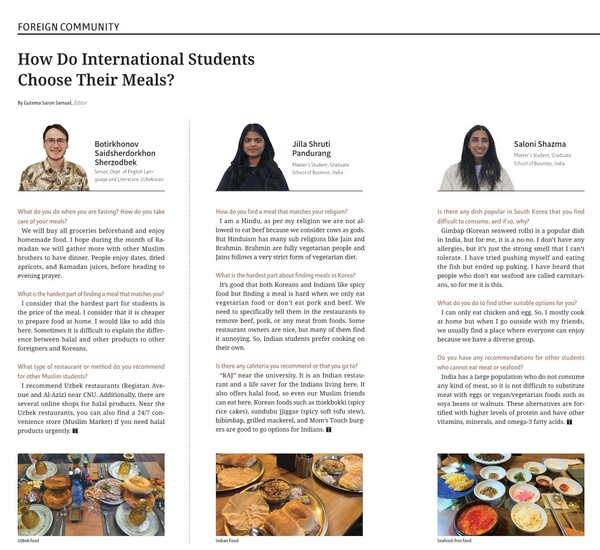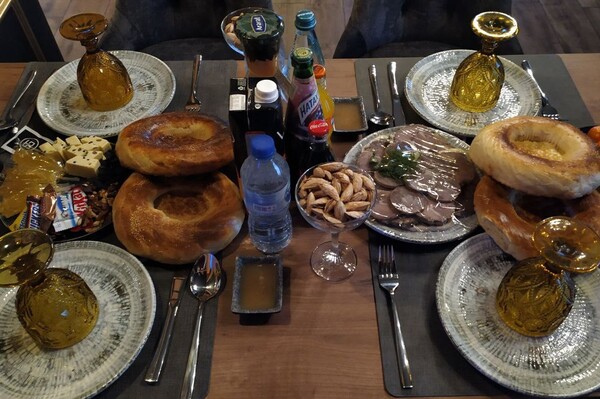외국인 학생의 삼시 세끼

Botirkhonov Saidsherdorkhon Sherzodbek
(Senior, Dept. of English Language and Literature, Uzbekistan)

Q: What do you do when you are fasting? How do you take care of your meals?
A: Fasting in the month of Ramadan is obligatory for every Muslim. When it comes to food, I think we will buy all groceries beforehand and enjoy homemade food. Additionally, I hope during the month of Ramadan we will gather more with other Muslim brothers (students) to have dinner (iftar) together. Typically, people enjoy dates, dried apricots, and Ramadan juices, before heading to evening prayer.
Q: What is the hardest part of finding a meal that matches you?
A: I consider that the hardest part for students is the price of the meal. So, some students prefer to buy products and cook at home. I consider that it is cheaper to prepare food at home. I would like to add this here. Sometimes it is difficult to explain the difference between halal and other products to other foreigners and Koreans.
Q: What type of restaurant or method do you recommend for other Muslim students?
A: It was not as convenient in the past, but nowadays, you can visit several halal restaurants. I recommend Uzbek restaurants (Registan Avenue and Al-Aziz) near Chonnam National University. Additionally, there are several online shops for halal products, such as Bozoraka, Azan market, etc. Furthermore, near the Uzbek restaurants, you can also find a 24/7 convenience store (Muslim Market) if you need halal products urgently. If you can go far from the university, visit Volgukton neighbourhood.
Jilla Shruti Pandurang
(Master’s Student, Graduate School of Business, India)
Q: How do you find a meal that matches your religion?
A: As India is a very diverse country with different religions and sub-religions, it is really hard to summarize the food restrictions. I am a Hindu, as per my religion we are not allowed to eat beef because we consider cows as gods. But Hinduism has many sub religions like Jain, Brahmin, etc. Brahmin are fully vegetarian people and Jains follows a very strict form of vegetarian diet, which restricts them from eating anything that grows under the soil.
Q: What is the hardest part about finding meals in Korea?
A: It’s good that both Koreans and Indians like spicy food but finding a meal is hard when we only eat vegetarian food or don’t eat pork and beef. We need to specifically tell them in the restaurants to remove beef, pork, or any meat from foods. Some restaurant owners are good to foreigners, but many of them find it annoying. So, Indian students prefer to stay outside the campus and cook on their own.
Q: Is there any cafeteria you recommend or that you go to?
A: “RAJ” near the university. It is an Indian restaurant and a life saver for the Indians living here. It also offers halal food, so even our Muslim friends can eat here. Korean foods such as ttoekbokki (spicy rice cakes), sundubu jjiggae (spicy soft tofu stew), bibimbap, grilled mackerel, and Mom’s Touch burgers are good to go options for Indians.
Saloni Shazma
(Master’s Student, Graduate School of Business, India)
Q: Is there any dish popular in South Korea that you find difficult to consume, and if so, why?
A: Gimbap (Korean seaweed rolls) is a popular dish in India, but for me, it is a no-no. I don't have any allergies, but it's just the strong smell that I can't tolerate. I have tried pushing myself and eating the fish but ended up puking. I have heard that people who don't eat seafood are called carnitarians, so for me it is this.
Q: What do you do to find other suitable options for you?
A: I can only eat chicken and egg. So, I mostly cook at home but when I go outside with my friends, we usually find a place where everyone can enjoy because we have a diverse group, mostly we end up choosing chicken, ttoekbokki or a pasta place.
Q: Do you have any recommendations for other students who cannot eat meat or seafood?
A: India has a large population who do not consume any kind of meat, so it is not difficult to substitute meat with eggs or vegan/vegetarian foods such as soya beans or walnuts. These alternatives are fortified with higher levels of protein and have other vitamins, minerals, and omega-3 fatty acids. Don't feel pressured to fit in, and if you're uncomfortable just tell your friends.
By Gutema Saron Samuel, Editor

